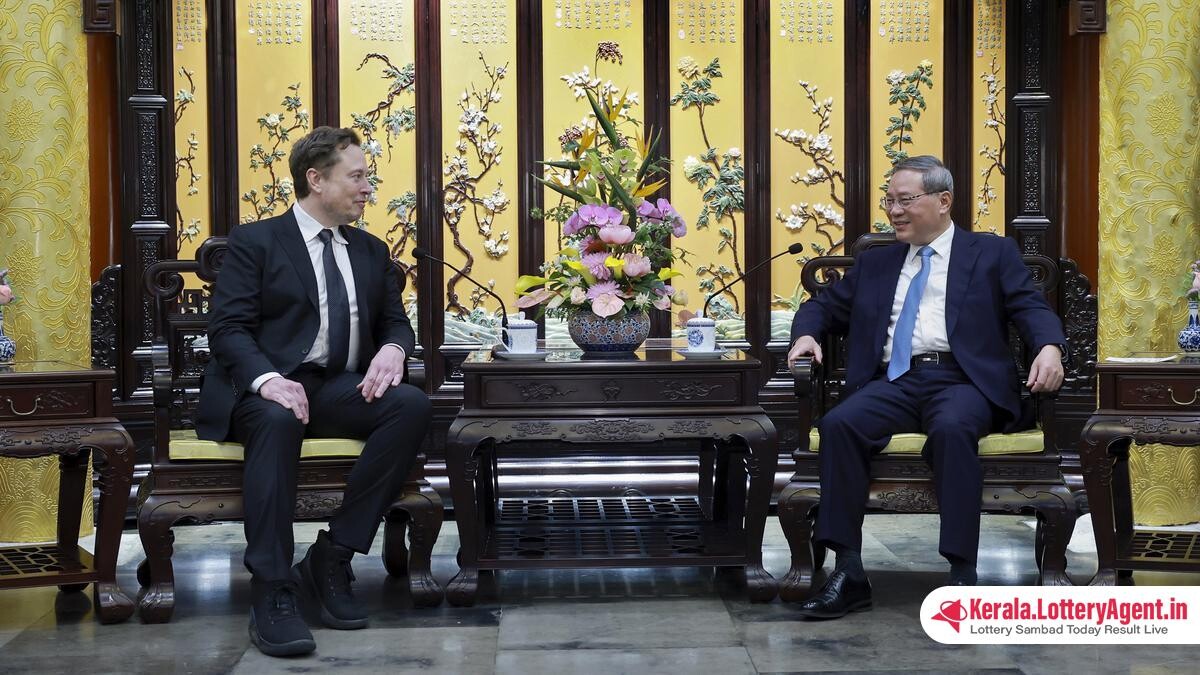
On an overcast Sunday that cast a mechanized gleam over wide boulevards, Tesla CEO Elon Musk arrived in the Chinese capital for a series of meetings that coincided with an extravagant display of electric vehicles at the Beijing Auto Show. Against the backdrop of an automotive industry shifting gears towards electrification, Mr. Musk found himself engaging with Chinese Premier Li Qiang in a dialogue that hinted at deepening bilateral economic ties amid complex geopolitical tensions.
During their dialogue, Premier Li expressed his hopes for increased “win-win” cooperation between the United States and China, shining a spotlight on Tesla’s operations within the Asian powerhouse as a paragon of successful business synergy. The remarks broadcasted by China’s state broadcaster CCTV during their main evening news program not only spotlighted Tesla’s presence in China but also subtly underscored China’s keen interest in attracting more foreign investment to bolster its economy, which has been facing a series of challenges.
Elon Musk’s presence in China serves as a striking contrast to the recent strains in Sino-U.S. relations marked by the assertive stance of American officials, exemplified by Secretary of State Antony Blinken’s visit. The Premier’s remarks to Musk highlight an attempt by China to weave a narrative of openness, especially in sectors like electric vehicle manufacturing, a field of heightened competition and innovation.
Although it remained unconfirmed whether Mr. Musk would grace the auto show, the event itself showcased the burgeoning ambitions of Chinese EV makers. These companies have been rapidly rolling out an array of electric cars, aggressively competing with Tesla by offering more affordable alternatives and seeking to claim a piece of the lucrative pie that is China’s EV market.
A prior report by CCTV revealed that the Tesla CEO was in China at the invitation of the China Council for the Promotion of International Trade and had met with its president, Ren Hongbin, to discuss the prospects of further cooperation and other pressing issues. These talks lay the groundwork for future strategic moves as Tesla deepens its roots in China.
A Shanghai manufacturing base proves Tesla’s commitment to China as not just a market, but a critical hub for its operations which span from local sales to exports destined for Europe and other regions. This focal position in Tesla’s global strategy recently manifested itself through significant price reductions for its Model 3 and Model Y in China, coming soon after similar cuts in the U.S., a move indicative of the company’s intent to bolster demand and maintain competitiveness.
Notably, the European Union’s ongoing investigation into Chinese EV subsidies could potentially spell challenges for Tesla’s European exports if tariffs are imposed. However, the bountiful state support of the green energy sector in China has indeed supercharged the EV market, catapulting electric vehicle sales to account for roughly one-quarter of all new car sales in 2022 and diminishing the stronghold of gasoline-powered counterparts.
Amidst these developments, global automakers such as Volkswagen and Nissan are not sitting idle but are instead fervently developing their own fleets of electric vehicles in a bid to secure a foothold or reclaim lost ground in the face of fierce competition, particularly in China, which is touted as the globe’s largest automobile market.
The juxtaposition of Elon Musk’s conversations with Chinese leaders and the EV showcases at the Beijing Auto Show paint a picture of a critical juncture for the automotive industry. As the electric future accelerates, international collaboration and competition are revving up in tandem, signaling transformative times ahead for economy, business, and finance in China and beyond.












